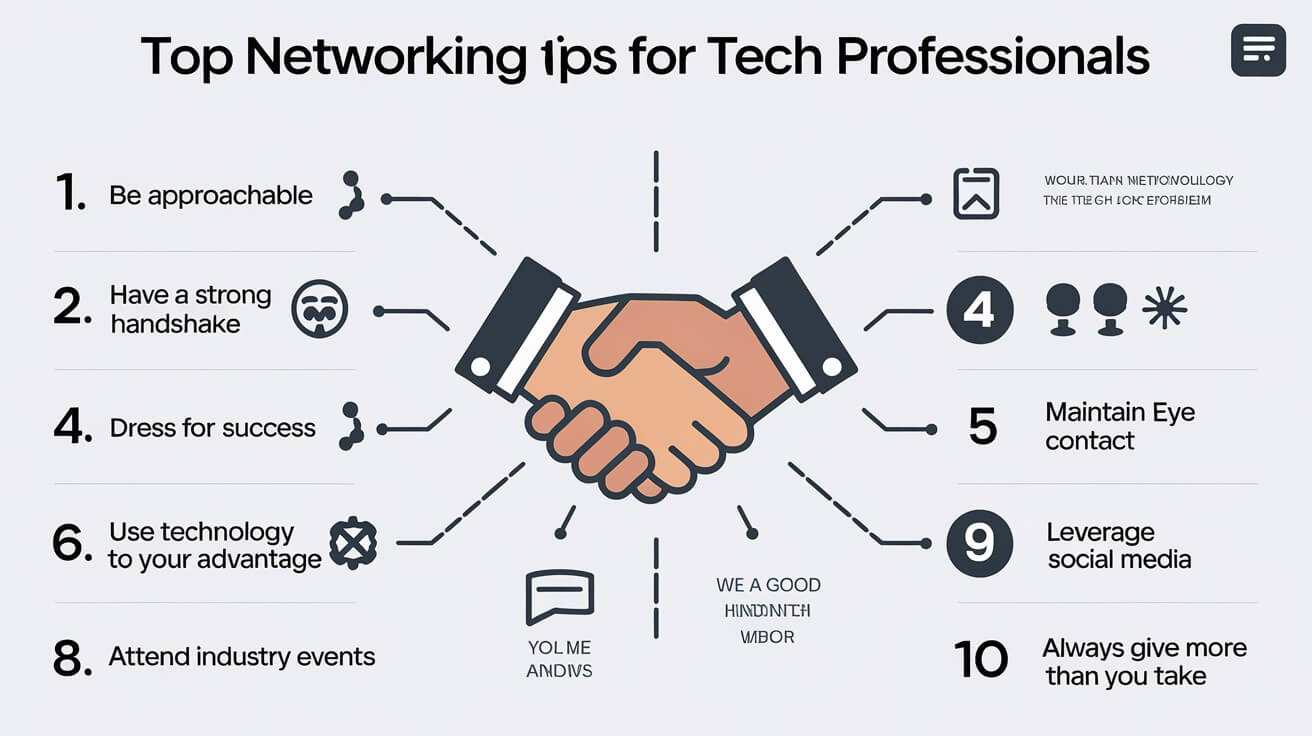
Networking Tips for Tech Professionals: Building Connections for Success
In today's tech world, networking goes beyond exchanging business cards or connecting on LinkedIn. For tech professionals, networking involves establishing significant connections that can create opportunities, encourage teamwork, and guide your career path with confidence.
But if the thought of networking feels overwhelming or even unnecessary, you're not alone. Many tech professionals, especially introverts, find networking intimidating and sometimes challenging to prioritize.
In this post, we'll explore how you, as a tech professional, can make networking work for you.
Whether new to the industry or looking to expand your professional circle, this guide will provide practical tips, online strategies, and insights tailored specifically to the tech landscape.
From strengthening your LinkedIn presence to engaging in online tech communities, these tips will help you confidently build connections that support your career aspirations.
Why Networking is Essential for Tech Professionals

Career growth and opportunity
Networking is one of the most powerful tools in your career development toolkit. In tech, where roles are highly specialized and often hidden from general job boards, your professional network can provide you access to opportunities you might never have otherwise.
Research shows that many tech positions are secured through networking instead of traditional application methods. Building a robust network can help you stay informed about job openings and learn about exclusive company roles or projects.
Mentorship and guidance.
Mentorship can be invaluable in tech, where innovation is constant. Networking helps you connect with mentors who can guide you, offer insights, and help you grow in your field. Many experienced professionals are open to sharing their journeys, discussing what worked for them, and advising you on pitfalls to avoid. Seeking mentorship through your network can substantially impact your professional growth.
Skill-building and knowledge-sharing
Networking is not just about job leads; it's also a chance to learn and share knowledge. Attending meetups, conferences, and even online forums can expose you to the latest trends and tools, keeping your skills sharp and relevant.
Common challenges tech professionals face in networking
While networking is crucial, it can be challenging, especially for those new to the process. Below are some common challenges tech professionals face and tips on overcoming them.
Introversion and social anxiety
For introverted professionals, significant events and even casual networking can feel draining. The idea of initiating conversations with strangers might seem daunting. But remember, networking doesn't have to be about endless small talk—it's about finding meaningful connections. Start with smaller, more intimate settings or online communities where you feel comfortable.
Time Constraints
The tech industry is demanding, and professionals often juggle multiple responsibilities. Finding time to network can be challenging, especially when working long hours. Look for ways to integrate networking into your schedule by connecting during lunch breaks or attending virtual events that don't require travel.
Being new to the industry
Breaking into tech as a newcomer can feel overwhelming, particularly when you need an established network. Start by reaching out to people in entry-level or similar positions. Joining online tech forums and attending beginner-friendly events can help you connect with others early in their careers.
Top Networking Tips for Tech Professionals

Build a Strong LinkedIn Profile
LinkedIn is essential for tech professionals. Here's how to make your profile stand out:
- Optimize Your Headline: Use keywords that reflect your skills and aspirations, such as "Software Engineer | Data Analyst | Cloud Enthusiast."
- Craft a Compelling Summary: Write a brief but engaging summary highlighting your expertise, interests, and career goals.
- Showcase projects: Feature relevant projects, portfolios, or GitHub repositories. Adding specific accomplishments helps others understand your capabilities.
Engage in tech-focused online communities.
Communities like GitHub, Stack Overflow, and Reddit's r/technology are excellent for connecting with others in tech. Here's how to leverage these platforms effectively:
- Contribute Regularly: Share knowledge, answer questions, and provide helpful insights. Consistent contributions increase your visibility.
- Ask thoughtful questions: Show curiosity and a willingness to learn, which can attract valuable connections.
- Join tech-focused groups on LinkedIn and Slack: These groups are often moderated, ensuring a professional environment.
Make the most of tech events and conferences.
Participating in events offers an excellent opportunity to meet people face-to-face. Here are some tips for making the most of these gatherings:
- Research Attendees and Speakers: Knowing who's attending helps you prepare and identify potential connections.
- Have a Few Talking Points Ready: Prepare questions or comments about recent tech trends to kickstart conversations.
- Follow-Up After the Event: To strengthen the connection, send a LinkedIn message or email that mentions your previous connection.
Leverage mentoring and peer connections.
Mentorship is a powerful form of networking. Here's how to approach it:
- Find Mentors: Contact experienced professionals on LinkedIn or through tech organizations. Express genuine interest in their work and politely ask if they'd be open to mentoring.
- Engage in Peer Groups: Remember to underestimate the power of peers. Join groups or meetups where you can share knowledge and experiences with those at similar career stages.
Following up and nurturing relationships
Building a network isn't just about meeting people; it's about maintaining those connections. Here are some ways to follow up effectively:
- Send personalized messages: "It was great meeting you at [event]! I'd love to stay connected and learn more about your work." goes a long way.
- Check-In Periodically: Stay in touch every few months with updates or to share relevant content.
- Offer Help: Networking is a two-way street. If you can offer assistance, do so—people remember those who help them.
Strategies for Effective Virtual Networking
As remote work becomes more prevalent, virtual networking has gained prominence. Here's how to make an impact online:
- Participate Actively in Webinars and Virtual Conferences: Introduce yourself in the chat, ask questions, and connect with speakers or attendees afterward.
- Use video platforms to engage: Opt for video meetings over voice calls; seeing each other helps build rapport.
- Join Online Communities and Attend Virtual Meetups: Many tech professionals are turning to online communities on Slack, Discord, and LinkedIn, which offer the convenience of connecting from anywhere.
Creating and Expanding Your Online Presence
You must maintain an active and professional online presence to succeed in networking. Here's how:
- Contribute to Discussions on Tech Forums: Platforms like Stack Overflow and Reddit allow you to share knowledge and build your reputation.
- Start a Tech Blog or Portfolio Site: A personal website showcasing your projects, skills, and experience is invaluable for credibility.
- Engage on Social Media: Use Twitter and LinkedIn to share industry insights, articles, and personal experiences. Regular posting helps you stay top-of-mind in your network.
Mistakes to Avoid When Networking in Tech
Avoid a "transactional" approach.
Networking should be about mutual benefit, not solely seeking favors. Creating authentic connections grounded in shared interests and goals is much more lasting.
Don't Forget to Follow Up
Meeting someone is just the first step. A lack of follow-up can result in missed opportunities. Even a quick email or LinkedIn message keeps the connection alive.
You need to pay attention to online networking opportunities.
Don't rely solely on in-person events. Many tech professionals find value in online interactions, which are often more accessible and less time-intensive.
Practical Tips for Networking as an Introverted Tech Professional
If you're introverted, networking can seem particularly challenging. Here are a few ways to make it work for you:
- Start Small: Attend smaller gatherings or join online communities where it's easier to engage.
- Set realistic goals: Aim to make one or two meaningful connections at each event.
- Focus on Quality Over Quantity: A few deep connections can be more valuable than a wide but shallow network.
Key Takeaways for Building a Strong Network in Tech
- Be intentional: Know what you want from networking and target those outcomes.
- Stay Active and Engaged: Consistent participation in online communities and industry events strengthens your network.
- Value Relationships: Treat networking as an opportunity to build lasting relationships, not just as a means to an end.
Conclusion
Networking isn't just about finding a new job or climbing the career ladder; it's about connecting with like-minded people who can provide support, guidance, and inspiration.
By actively investing in your professional relationships, you're positioning yourself for long-term success in the tech industry. Start small, stay consistent, and remember that your network is one of the most valuable assets in your career.
Following these tips will make networking manageable. It can be one of the most rewarding parts of your tech career. So, take the first step today. Connect, share, and grow!
Technology Information Technology

